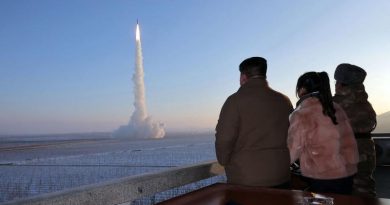Ramp up maritime security, ex-Japan diplomat warns

The president of the Foreign Policy Institute Japan has suggested that Thailand needs to strengthen its maritime security as global geopolitics are becoming increasingly intense, particularly in Asia and the South China Sea.
Kunihiko Miyake, who used to serve as a Japanese diplomat, recently visited the Japanese embassy in Thailand.
On this occasion, Mr Miyake also spoke with the Bangkok Post about how the changing geopolitical situation has been affecting Asia and Thailand in particular. He gave the interview on the sidelines of an event themed “Geopolitics of Asia: Japanese Perspective”.
Mr Miyake urged further collaboration between the two countries. He said Thailand is seen as a strategic location that benefits from good ties with neighbouring countries.
Therefore, the main threat is potentially a maritime one because the Gulf of Thailand extends into the South China Sea, he said.
“The Gulf of Thailand is considered among Thailand’s sources of wealth and security as it is one of the important areas for transporting goods … to the rest of the world, and is much more cost-effective and cheaper than railways.
“That is why you need [sea-based] communication to the northern part of East Asia, to the Gulf of Thailand to get more energy, to Europe and elsewhere if Thailand continues to be a prosperous industrial nation. This is the geopolitics of Thailand,” he said.
Mr Miyake went on to say that Japan is an island nation and, therefore, heavily dependent on maritime trade, whereas Thailand is more geographically diverse but does not suffer from hostile ties with any of its neighbouring countries.
Although China is at something of a geographical remove, the South China Sea remains a potential vulnerability in the event of any dispute with China, he said.
“They want to control the water areas. They want to destroy the dominant US naval hegemony in this part of the world,” Mr Miyake said.
“Thailand has been heavily dependent on water, [same] as the Vietnamese, but they have different problems with the Chinese. The Philippines are also [in] the same [position]. This is why we need Thailand because Thailand, in my view, is a very precious stone in the Asean region. You are a great status quo power, and you want it to remain like this, as a free democratic nation,” he added.
He also suggested Thailand continue balancing its great power ties with the United States. He said the United States is keen to protect Thailand’s interests and enhance them.
Japan’s view
Japan’s ties with the United States are based on mutually cooperative relationships, he said. Washington needs Japan to help deter China because the US has bases in Okinawa close to Taiwan, making Japan strategically indispensable, he noted.
“So they need us, and we need them. But since 1945 we are mostly in need of each other. We continue to use America in a good sense, and they continue to use us in a good sense because we help each other.
“We want to stay as we are or stay as the status quo power. So, let’s use Americans to defend us and keep the status quo. Thailand is [also] a status quo power, to the best of my knowledge, and they [the US] are not changing anything [in Thailand],” Mr Miyake said.
“They [the US] want to stabilise this [Asean] region because Thailand is located at the centre of this region, so the rest [of Asean] is counting on you,” he added.
When asked how Japan and Thailand could strengthen their maritime communications and how Japan could help Thailand navigate its way through a period of intense geopolitical change, he said Japan is not a great military power, and it will not be one again.
However, the country still needs to stabilise its maritime territories with like-minded countries, he noted.
“The best thing we can do is help like-minded nations provide maritime law enforcement equipment or training or cooperation, including coast guard abilities.
“That is why we have been assisting the Philippines and Vietnam. But if you have a coast guard or navy, we can do a lot. I think we provided the Philippines with a radar system recently.
“So if this is not seen as a form of military power, it is still a very defensive identification radar to detect potential threats, and Thailand has to prepare its own defences using that kind of mechanism. Then you need to have, probably, more vessels with more skilled coast guard crew so that you can protect your waters. That is one example,” he said.
Global perspectives
Furthermore, he suggested Thailand’s intellectuals, including journalists, could embrace broader global perspectives rather than focusing mostly on one region.
“Japan is not Japan-China, Japan-US only. We have global interests and perspectives. So we started with Asean in the 70s and we learned hard lessons in the Middle East in the 70s.
“We are now learning a lot from Europe. So, those three areas are not separate from each other. Unfortunately, whether you like it or not. Thailand is not separated from those areas, either.
“I think if you contribute to those [areas] intellectually, in a sort of strategic thinking, you can further your national interest in this part of the world, not only in Asean but also in East Asia, the Indo-Pacific, Europe and the Middle East.
“I want Thai intellectuals to have a broader and more globally strategic perspective and then reconsider Thailand’s interests in that context. Not in the context of Asean or the Indochina peninsula. That is the way to maximise the national interest of Thailand,” he added.
Source – Bangkok News




